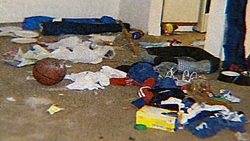Lawmakers Say Rent Subsidy Should Go Directly to Landlords
By Johnny Destino
After all, they get their subsidies based on the sworn statement that they are paying rent.
Now someone is finally addressing the injustice that occurs when welfare recipients choose to take the subsidy, but fail to pay the rent that was a condition of them getting benefits in the first place.
Fair is fair.
Niagara County Legislative Minority Leader Dennis Virtuoso is sponsoring legislation to curb this widespread problem and he thinks it will go a long way toward helping landlords maintain their properties while alleviating housing insecurity for many families in Niagara County.
Legislators Owen Steed and Jason Zona are joining Virtuoso in offering three proposals at tonight’s (January 15th) Legislative meeting to change the way Temporary Assistance (“TA”) payments are made in Niagara County for those receiving rent assistance. The goal of the reform package is to increase accountability for individuals receiving public assistance and to help property owners maintain and improve the Niagara Falls housing stock.
“Our caucus views temporary state assistance as a grant with specific costs. The Niagara County Legislature needs to ensure that temporary assistance pays the bills it is intended to, just like in our own household budgets,” said Virtuoso. Under the current system, a tenant can unilaterally redirect the money used to pay rent to themselves instead of their landlord. While there may be legitimate reasons to do so, the resulting shortfall often has harsh consequences for tenants who fail to pay or catch up on their rent.
More often than not, the unpaid rent leaves overburdened property owners with no alternative but to begin costly and time consuming eviction proceedings or risk losing months’ worth of income.
“Temporary assistance is meant to help local families create a safe and stable living environment,” said Bob Pascoal, president of the Landlord Association of Greater Niagara. “Our members want to provide safe, clean and affordable housing to people of all income levels. Unfortunately, if the monthly rent is not paid, the purpose of the grant is defeated, and both the landlord and tenant suffer financial and emotional consequences.”
For property owners in Niagara Falls, the choice to evict isn’t made lightly, but the risk in delaying a decision could compound their losses while waiting for their day in court. Court costs and attorney fees alone can run property owners upwards of $500 to remove a tenant. These lost costs and rents are among the factors making it difficult to preserve the integrity of a neighborhood as a result of a reciprocal lack of reinvestment in the property.
“There is a trickle-down effect that starts with an unpaid rent that can end with families on the street and blighted buildings. We see the results on the streets of Niagara Falls every day, and the issue must be addressed,” said Legislator Zona.
The Minority Caucus’ proposal calls for the TA shelter allowance to be paid directly to the property owner and not the dependent tenant. This change would eliminate many of the problems at the source by making sure the rent is being paid each month and greatly reduce eviction, relocation, and home repair costs.
Additionally, the new legislation would require tenants to sign an affidavit indicating that they will utilize their shelter allowance for the payment of housing costs and would, for the first time, impose civil and criminal penalties for those who do not adhere to the restrictions.
Lou Rizzo, a local landlord and member of the Landlord Association, has been working for years to highlight and remedy the injustices perpetuated by this “loophole.”
“About two years ago, as a member of the Landlord Association, I went to Social Services to ask this question: If a tenant is allotted a housing shelter of $400 for rent and they take that money and spend it on their drug habit, why is that not considered a misappropriation of government funds and treated as a crime?”
According to Rizzo, the answer from Social Services was “shocking.” “Social Services, a government agency, said that they only need to show an obligation to pay rent. What they do with that money is their business.”
Since learning that there was no remedy under current law to prevent misuse of shelter allowances, Rizzo and other members of the Landlord Association have been working with county and state officials to have this resolution drawn up and hopefully make its way through to the governor’s desk to correct this grave injustice.
“We want to make sure that if that obligation [for welfare recipients who receive subsidies that is based on them paying rent] is not fulfilled that it will now be treated as a crime. This affects our local economy in so many ways and increases the number of abandoned homes and neighborhood blight,” said Rizzo.
For many people, Rizzo included, this issue goes beyond simply making sure landlords are receiving their rent each month. “More importantly, eliminating this loophole will positively affect the lifestyle of the children whose parents are in the system,” said Rizzo. “We are literally funding drug use for some of these recipients and these children grow up in a lifestyle of moving from property to property, destroying everything in their path.”
This instability is not healthy for children and imposes additional costs upon local school districts that must continually track and register them throughout the district. “It’s creating the next generation of welfare recipients, not to mention the type of students these children become in our school system. Many drop out before their 16th birthday and take to the streets because of the unstable home life you and I are helping to subsidize,” said Rizzo.
Correcting this policy by passing this legislation will have wide-ranging implications beyond merely making sure landlords receive their rent money according to Rizzo. The alternative has proven to be a failure, according to Rizzo. “Let's look what our tax dollars have bought us: we are the third poorest city in the country, the highest taxed county per capita, the 51st worst crime rate per capita in the country, and we have 20 percent of our housing stock abandoned.”
The City of Niagara Falls certainly has its challenges but local officials are hoping that this package of reforms being presented to the County Legislature will result in strengthening its ability to revitalize neighborhoods.
“We need tools that help stabilize households and neighborhoods. In this case, stability starts with personal accountability, a roof over head, and keeping landlords and tenants out of eviction court,” said Seth Piccirillo, director of Niagara Falls Community Development. “It is important that the city’s county legislators are working hand in hand with the Landlords Association and our department. Improving Niagara Falls’ housing stock is a top priority for everyone involved.”
Virtuoso is requesting, as part of this legislative package, passage of a home rule message from the State of New York, allowing Niagara County to make these changes on a local level without revising the state law. A home rule message must be passed by both the State Senate and Assembly and signed into effect by the governor.


